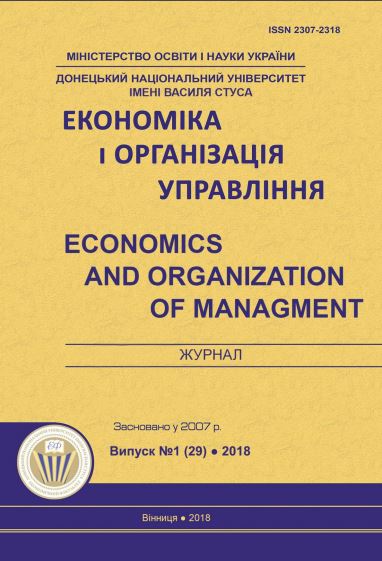Provision of conformity of educational potential to the needs of the economy in conditions of improving effectiveness of state social policy.
Keywords:
educational potential, social policy, employers, educational institutions, employment, competitiveness, professional orientation, monitoring, forecastingAbstract
In the article the priority directions of ensuring the compliance of educational potential with the needs of the economy in the context of increasing the efficiency of state social policy are identified. The results of the study have established that in the current conditions of economic development, effective cooperation between professional and higher education institutions and potential employers is important for increasing the effectiveness of state social policy in the direction of ensuring the adequacy of educational potential to the needs of the economy. It is proved that the creation of mechanisms for interaction between education and the real sector of the economy will ensure the high quality of the workforce on the basis of a combination of theoretical training and practical training. It is substantiated that it is necessary to increase the motivation of employers to participate in the preparation of training programs, the harmonization of educational and professional standards, the updating of the technical base of professional schools. It is determined that it is important to introduce constant monitoring of the demand for professions and employers' requirements for candidates for vacancies associated with these professions, and for forecasting the demand for professional staff. The practical significance of the results is the ability to use them during making effective and timely management decisions in the area of ensuring the compliance of educational potential with the needs of the economy, which will contribute to increasing the effectiveness of state social policy.References
Безтелесна Л. Механізми взаємодії роботодавців та вищих навчальних закладів в системі безперервної освіти / Л. Безтелесна // Нова педагогічна думка. - 2013. - № 1.2. - С. 174-177.
Ільїч Л. М. Взаємодія ринків праці та освіти: сутність, характерні риси та модель функціонування / Л. М. Ільїч // Економіка та держава. - 2017. - № 4. - С. 69-74.
Кримова М. О. Оцінка конкурентоспроможності молодих фахівців з економічною освітою на ринку праці України / М. О. Кримова // Демографія та соціальна економіка. - 2015. - № 2. - С. 53-64.
Лісогор Л. С. Європейський досвід прогнозування потреби у робочій силі в контексті формування інноваційних перспектив трансформації зайнятості в Україні / Л. С. Лісогор // Ринок праці та зайнятість населення. - 2016. - № 1. - С. 17-20.
Петрова І. Л. Інноваційний сегмент ринку праці: оцінка тенденцій та перспектив / І. Л. Петрова // Демографія та соціальна економіка. - 2018. - № 1. - С. 166-180.
Шаульська Л. В. Проблеми та можливості активізації освітнього потенціалу у становленні соціальної відповідальності в Україні / Л. В. Шаульська // Діагностика стану та перспектив розвитку соціальної відповідальності в Україні (експертні оцінки): монографія / О.Ф. Новікова, М.Є. Дейч, О.В. Панькова та ін. – Донецьк: ІЕП НАН України, 2013. – С.100-110.
Макарова О.В. Соціальна політика в Україні: Монографія / О.В. Макарова; Ін-т демографії та соціальних досліджень ім. М.В. Птухи НАН України. – К., 2015. – 244 с.
Войналович І. А. Освітні чинники підвищення конкурентоспроможності робочої сили України: Дис... канд. екон. наук: 08.00.07 / І. А. Войналович; ІДСД. – К., 2013. – 274 с.
Лісогор Л. С. Освітні чинники забезпечення інноваційного людського розвитку / Л. С. Лісогор // Науковий вісник Полтавського університету споживчої кооперації України. – 2008. – №3 (30). – С. 421-424.

